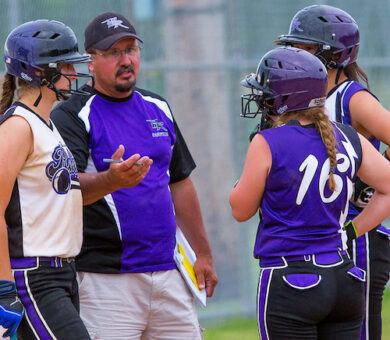5 Helpful Tips for Coaches on How to Handle Parents
Parents’ involvement in their children’s sports activities is at an all time high, and it begins at a very early age. Parents register their children for sports teams early-on and become accustomed to controlling many decisions around their child’s progress. Many parents even become coaches with the intention of helping their child have a great experience.
Much of the early sports life is therefore controlled by parents.
As the young athletes age, parents are asked to give up most of that control. Particularly when the child reaches upper middle school or junior high and on into high school, the parents must step aside for the club, travel, and high school coaches to make most of the decisions surrounding the athletes.
This is a major shift, and one that is quite difficult for most parents.
So how do coaches deal with the parents?
For most coaches, dealing with parents can sometimes feel like a full-time job. It’s best to formulate a well-thought-out plan with the entire coaching staff onboard.
Assistant coaches can also help you deal with parent issues. They are more valuable than just knowing the skill set needed to compete in your sport.
Communication
Effective relationships begin and end with good communication. This has to be the top pillar for every coach when dealing with the parents in your program. What does good communication look like?
Communication With Administrators
Having open and honest communication with your administrators is important. What is their philosophy in dealing with parents? If an angry parent comes to them, how will they handle it? Do they send them back to the coach, or do they take meetings without the coaching knowing? You need to know their approach.
You also need to know if they will support your decisions and expectations. Do you have the backing of your administrators, or are you on your own?
Every administration is different, and their decisions may or may not satisfy you. However, you need to know as much as possible about how you will be treated as a coach and program. Good communication is a great start.

Parent Meetings
An early parent meeting is helpful to initiate communication with the parents. In this meeting, you can share your thoughts about the season, coaching philosophy, beliefs about this year’s team, and also clearly state your intentions and expectations.
Scheduling a pre-season meeting, before practices even begin, helps parents hear your information without judgment or assumptions because nothing has happened yet. You begin the year with everyone onboard.
On the contrary, if you hold that parent meeting right after the first practice, for example, and a parent sees his or her child not in the “starting lineup,” decisions and frustrations begin to brew. Those frustrations will likely come to your first parent meeting, and now you begin the new season with an unhappy parent and potentially a fire to put out.
The good thing about this meeting is it gives you a chance to be transparent. The more transparent and the better communication you have, the better your opportunity to keep everyone on the same page.
Communication With Players
Even though we are talking about parents, student-athletes need your communication as well. The athletes play a huge role in maintaining the temperature of their parents. Encourage players to communicate openly with their parents.
The better relationships you have with your players, even the ones who are not playing as much, the better your chances of controlling disgruntled parents. Good relationships take work, but they pay off on teams.
Listening
Listening is as much a part of communication as speaking. When there are disgruntled parents, it is your choice on how much you agree or disagree, but allowing them to get their points across will usually lower walls and anger.

Setting Clear Expectations
What are the things that are most important to you for your team and for the parents? For example, when it comes to playing time, some coaches say they will not talk to parents about playing time, period. Others say they won’t talk to parents on the day of the game, including directly after the game. Still other coaches say they’ll only talk about playing time with the parents when the student-athlete is also present.
These are clearly three different approaches. You may have a different one. Whatever the expectations are, set them, stick to them, and make sure your entire staff, team, and parents know what they are.
There may be other expectations as well. Here are a few examples of some questions you have to answer before you can formulate expectations as a coach:
Travel
- Who can travel on the bus for away games?
- Can parents bring their daughters to games and/or leave with them after games?
- Can parents hand out candy bars or other food on the bus before the game?
Competition Day
- Do student athletes have to be at school to play in the competition on game day?
- What time do players have to show up on game day?
- Can parents come to the bench and talk to players during the game?
- Where do parents sit?
- What expectations are there for body language for student-athletes and parents?
- How do the parents/players deal with the refs during games?
- Can parents warm up their child at the competition site before the game?
Practices
- Are parents allowed in practice?
- Can they talk to their child during practice?
- Where do the parents sit?
- Can the parents talk to the coaches during practice?
- Are any (or all) practices closed to parents?
This is a very short list of the areas around which you might have expectations. What other areas of concern do you have for your parents? Make sure you have your thoughts in place so you can clearly communicate your expectations to parents.
Some coaches even have parents and student-athletes sign contracts that they understand the expectations and will accept them.

Give Feedback
Sometimes coaches shy away from giving parents critical feedback about their children. Giving specific feedback will help the parents understand your decisions as a coach. You know your decisions are best for the team. Most parents won’t see it this way.
Don’t be afraid to be honest with the parents. If their child needs to work on something or, for example, spend more time at schoolwork, then tell them. If their child is a troublemaker or a bad teammate, let the parents know what you are working on to better the situation.
If you think your player has a talent level that you think would fit at a certain level of play, share that as well with the parents. It is all useful feedback that parents should want to know.
Consistent feedback for both parents and student-athletes shows you are watching and monitoring progress.
Find Ways to Include Parents
What can the parents do to feel part of the team but not feel like they own the team? Coaches have come up with some creative ways to incorporate parent involvement.
Here are some ways parents engage with their children’s teams:
- Share the pre-game meal opportunities throughout the year.
- Organize the holiday parties for the team.
- Come up with the theme for the year.
- Decorate locker rooms and buses for big games.
- Make cakes for birthdays.
- Make motivational posters, highlight videos, etc. throughout the season.
- Organize movie nights for the team.
This list is short, but it gives some ideas of how parents feel like they are part of the team.

Try to Keep It Positive
Anger and yelling rarely achieve a desired outcome. Keeping your cool demonstrates you are in control of the situation. If a parent wants to get angry with you or yell at you, that is not the time to try to argue or talk to them. Ask them to come back when they can have a conversation as opposed to a yelling match. It’s not worth your mental health to field off angry parents.
Coaching is hard, but it is also very rewarding. Relationships play a role, and parents are part of the equation.
Brainstorm with your staff about the worst that could happen with parents in this particular season and have a plan in place. Then focus on what is really important for you to win and to stay positive with your team.
You have a huge role in the life of each of your student-athletes, and you will make a difference for them with or without the parents understanding your process.
At the end of the day, you can walk away knowing you helped someone grow as a person and as an athlete.


